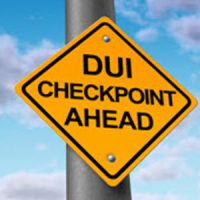Top Five DUI Checkpoint Requirements

The Bill of Rights protects people from government overreach. But some Constitutional protections, most notably the Fourth Amendment, don’t apply at DUI checkpoints. Because of this shortcut, most police departments would probably set up DUI roadblocks every weekend if they could. But checkpoints are very costly and usually rolled out during Memorial Day Weekend and other drinking and driving holidays.
Checkpoints allow officers to overlook some rules. But they must comply with a whole new set of rules, some of which are outlined below. If the checkpoint fails to check any box, no matter how “minor,” the roadblock is illegal, and a Virginia DUI defense lawyer can get the stop thrown out of court. If the stop was illegal, the rest of the law enforcement encounter was illegal as well. So, the state’s case collapses like a house of cards.
Top-Level Authorization
In 1993, the Supreme Court gave state legislatures the thumbs up/thumbs down power regarding DUI checkpoints.
Almost immediately after the Justices gave states this choice, Virginia legislators authorized checkpoints. However, they didn’t amend the state’s constitution. So, the current legislature, or any future legislature, could revoke that approval.
‘Leesburg criminal defense lawyers advocate for defendants not only in the court, but also in the statehouse. We continually push for defendant-friendly criminal laws, such as the revocation of DUI checkpoint authorization.
High-Level Setup
Only a police chief, county sheriff, or other high-level law enforcement supervisor can order officers to set up a checkpoint. The local CLEO (chief law enforcement officer) usually applies for a government grant or other funding source to finance the checkpoint, as mentioned above.
The CLEO may designate a time and place (like 9-11 on Memorial Day in eastern Leesburg). Then, a right-hand man may flesh out the details, like the specific location and number of officers working the checkpoint. Organizational activity cannot go any lower. More on that below.
Pre-Checkpoint Publicity
The sponsoring agency must give Loudoun County motorists a chance to avoid the area altogether, if they choose to do so.
On a related note, the checkpoint itself must give motorists an opportunity to turn around before traffic backs up. More on that below.
In terms of pre-checkpoint publicity, a digital sign broadcasting the checkpoint’s date and time is clearly sufficient. A general press release is probably sufficient. A post on the department’s Facebook page is probably insufficient.
Adequate Signage
DUI roadblocks aren’t speed traps. Officers cannot conceal themselves and pull over motorists at the last second. Instead, digital or other signs must alert drivers and give them general instructions (e.g. “Have Drivers’ License and Proof of Insurance Ready”). The checkpoint itself must be well-lit, for the safety of both officers and motorists.
Incidentally, if you make a sudden U-turn when you see a “Checkpoint Ahead” sign, a patrol car will probably follow you. But officers cannot pull you over without a reason independent of your U-turn.
Neutral Formula
Police officers must detain motorists according to a neutral formula, such as one out of every three vehicles. The CLEO or right-hand man must set this formula. Checkpoint officers may only change this formula if traffic backs up and the waiting time becomes unreasonably long, usually more than about twenty seconds. The new formula must also be neutral. When traffic thins out, the old formula must go back into effect.
Count on a Dedicated Loudoun County Lawyer
There’s a big difference between an arrest and a conviction in criminal law. For a free consultation with an experienced criminal defense attorney in Leesburg, contact Simms Showers, LLP, Attorneys at Law. Convenient payment plans are available.
